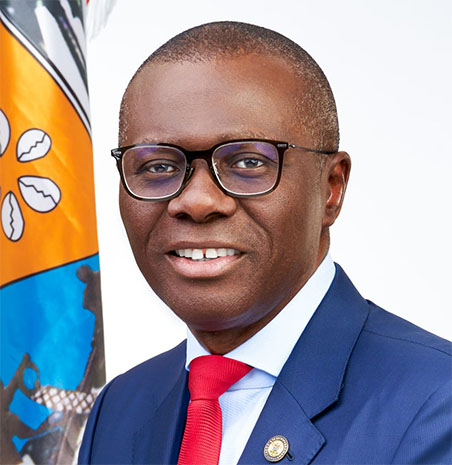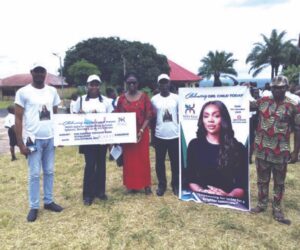1
When Lagos State Governor, Mr. Babajide Olusola Sanwo-Olu, mounted the podium at the NEPAD Business Group Nigeria High-Level Business Forum held at the Eko Hotel and Suites, Victoria Island, on October 30, 2025, the air in the hall carried the weight of expectation.
Gathered before him were some of Africa’s most influential policymakers, business leaders, and development partners. The theme of the forum, “Mobilising Africa’s Private Sector for AfCFTA Towards Africa’s Economic Development Amid Global Uncertainty”, was both timely and ambitious.
It sought not just to explore economic theory, but to redefine Africa’s position in a fast-changing global order.
Sanwo-Olu’s address was not the typical ceremonial speech that fades after the applause.
It was a rallying call, a challenge to African entrepreneurs and governments alike to look inward, think boldly, and act decisively. “You are gathered precisely where Africa’s ambition meets possibility,” he told the audience.
“This is where public policy meets private vision, and where businesses are given the freedom to thrive.”
The setting was fitting. Lagos, Nigeria’s economic nerve center, is arguably Africa’s most vibrant business ecosystem, a city where innovation, grit, and enterprise collide daily to create opportunities.
From the humming markets of Balogun to the emerging tech clusters of Yaba, Lagos is a living laboratory for the African Continental Free Trade Area (AfCFTA) dream: an Africa that trades more with itself and competes on equal footing with the world.
Sanwo-Olu, represented by Lagos State Commissioner for Commerce, Cooperatives, Trade and Investment (CCIT), Mrs. Folashade Kaosarat Ambrose, captured the mood of an era defined by contradictions.
On one hand, Africa stands on the brink of transformative opportunity, a single market of over 1.3 billion people under AfCFTA. On the other hand, global uncertainties threaten to derail progress: volatile currency fluctuations, supply chain disruptions, inflation, and political instability across regions.
“The world today faces constant changes, shifting trade patterns, inflation, climate concerns, and unpredictable political tensions,” the governor said.
“Yet for Africa, they also present a chance to rethink how we trade, how we produce, and how we build resilience through cooperation.”
That statement reflected a pragmatic worldview, one that recognises that global volatility is not an excuse for stagnation, but a spur for adaptation. Indeed, Africa’s economic growth in the coming decades will depend not on external aid or goodwill, but on how effectively the continent mobilizes its private sector to seize the opportunities AfCFTA presents.
In positioning Lagos as the natural home for a conversation about AfCFTA and private sector leadership, Sanwo-Olu offered tangible evidence of what can be achieved when government becomes an enabler rather than an obstacle.
“Here in Lagos, we understand the power of private enterprise,” he said. “From the thriving tech ecosystem in Yaba to our deep-sea port in Lekki, and our industrial zones across the state, we are building an economy that encourages innovation, trade, and investment.”
Those words are backed by action. The Lagos State government has, over the years, pursued an aggressive agenda of infrastructural renewal, industrialization, and digital integration.
The Lekki Deep Sea Port, now operational, is one of West Africa’s most advanced maritime gateways, expected to transform regional trade logistics.
The Lekki Free Zone hosts several industrial projects, including refineries, fertilizer plants, and manufacturing hubs designed to feed into Africa’s expanding value chains.
In addition, Lagos has continued to attract global and local investment in technology. The Yaba Innovation District, often dubbed “Yabacon Valley,” is home to some of Nigeria’s biggest tech startups, many of which are already scaling across African borders. For Sanwo-Olu, this is proof that with the right policies, African cities can become the driving forces behind the continental trade revolution AfCFTA envisions.
At its core, the African Continental Free Trade Area aims to create the largest free trade area in the world, connecting 55 countries into a single market. By reducing tariffs and non-tariff barriers, AfCFTA promises to expand intra-African trade, industrialise the continent, and lift millions out of poverty.
But as Sanwo-Olu rightly observed, signing agreements is one thing; implementing them is another. “Governments can negotiate tariffs and treaties,” he reminded the audience, “but businesses must produce, export, invest, and believe in cross-border possibilities.”
The AfCFTA framework, while ambitious, cannot succeed without deep private sector buy-in. This means not just large corporations, but also small and medium enterprises (SMEs), the backbone of Africa’s economy.
Across the continent, SMEs account for over 80% of jobs, yet they remain marginalized by poor access to finance, weak infrastructure, and limited exposure to regional markets.
Sanwo-Olu’s prescription was clear: empower SMEs through finance, mentorship, and technology. “They are the heartbeat of Africa’s private sector,” he said.
“To empower the SMEs, we must improve access to finance, mentorship, and technology. Lagos has been championing this through initiatives like the Lagos State Employment Trust Fund (LSETF), which provides capital and training to entrepreneurs.”
The LSETF model, which has already supported thousands of small businesses in Lagos, could serve as a blueprint for similar interventions across Africa. “Scaling such initiatives,” Sanwo-Olu argued, “will help SMEs benefit directly from AfCFTA.”
The Lagos governor also spotlighted the digital revolution as a defining force in the future of African trade.
“Digital trade, e-commerce, and fintech are changing how business is done,” he said. “Africa must embrace technology to simplify cross-border transactions and improve efficiency.”
Indeed, technology offers Africa the shortest route to economic inclusion. Mobile payments, digital logistics, and blockchain-based trade systems can dismantle many of the physical and bureaucratic barriers that have long constrained commerce. Lagos, often regarded as the fintech capital of Africa, already provides a glimpse of what’s possible. Nigerian companies such as Paystack, Flutterwave, and Moniepoint, all with Lagos roots, are expanding across Africa, enabling seamless payment systems that underpin digital trade.
Sanwo-Olu urged African governments to invest in digital infrastructure and regulatory harmonization to make such innovations scalable across borders. “Lagos,” he said confidently, “is already leading in this space as the tech capital of Nigeria, a model that can inspire other regions.”
The governor’s message was unambiguous; Africa can no longer afford to operate in isolation or fragmentation.
“This is the time for collaboration, not competition; for unity, not isolation,” he declared. “If we succeed in mobilizing our private sector effectively, Africa will overcome global uncertainty and emerge stronger, richer, and more self-reliant.”
The NEPAD Business Group forum itself symbolized that collaborative spirit. Delegates from across Africa discussed how to align national policies with AfCFTA goals, strengthen value chains, and foster public-private partnerships that deliver tangible results. For Lagos, the event also reaffirmed its strategic importance as a continental convening ground for trade and development dialogue.
Sanwo-Olu’s tone throughout his speech balanced optimism with realism.
He acknowledged the challenges ahead, from currency volatility to political instability, but insisted that Africa’s destiny is still within its control.
His refrain echoed the urgency of leadership and accountability: “Our duty is to make that vision real. I want us to take this forum as a call to action to turn Africa’s potential into prosperity.”
To observers, Lagos stands as a metaphor for Africa’s contradictions, chaotic yet creative, burdened yet buoyant. It mirrors both the problems and the promise of the continent.
For Sanwo-Olu, however, it is more than a metaphor; it is proof that ambition, when matched with policy consistency, can yield progress.
Lagos’ population of over 20 million presents challenges in infrastructure, housing, and logistics, yet it also provides the workforce, innovation, and consumer demand that make it a magnet for investment. The state’s massive investments in transportation (from rail projects to waterways), housing schemes, and digital transformation are gradually reshaping it into a regional economic powerhouse.
The governor’s push to link Lagos’ growth to AfCFTA reflects a broader understanding: that no African state or city can thrive in isolation. Economic integration, he argues, is not just a diplomatic concept , it is a survival strategy.
Sanwo-Olu’s remarks at the forum resonated far beyond Lagos. They spoke to the anxieties and aspirations of a continent searching for direction. Africa, he implied, cannot keep waiting for perfect conditions to act. Global uncertainties are not going away , but neither is Africa’s potential.
If the AfCFTA vision is to move beyond boardrooms and policy papers, it must find its heartbeat in the private sector, in the factories, farms, startups, and markets where Africans work every day. And if Lagos’ example is anything to go by, the formula for progress lies in pragmatic partnership: where governments create the enabling environment and businesses take the lead.
As the applause faded at Eko Hotel that day, one thing was clear: Sanwo-Olu’s message had struck a chord. In a time when global economies are contracting and protectionism is resurging, Africa’s best defense may indeed be its own unity, and its private sector, its strongest weapon.
In his final words, Sanwo-Olu captured the spirit of that conviction: “If we mobilize our private sector effectively, Africa will not just survive global uncertainty, it will rise above it.”








